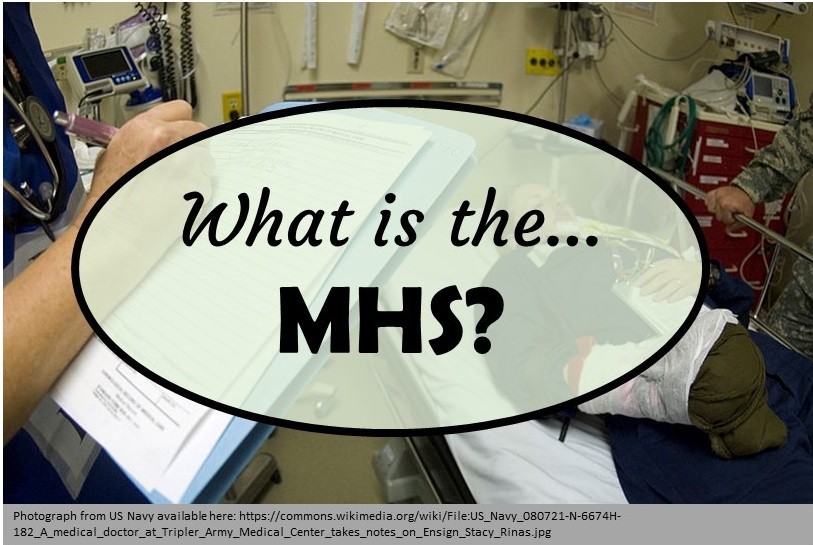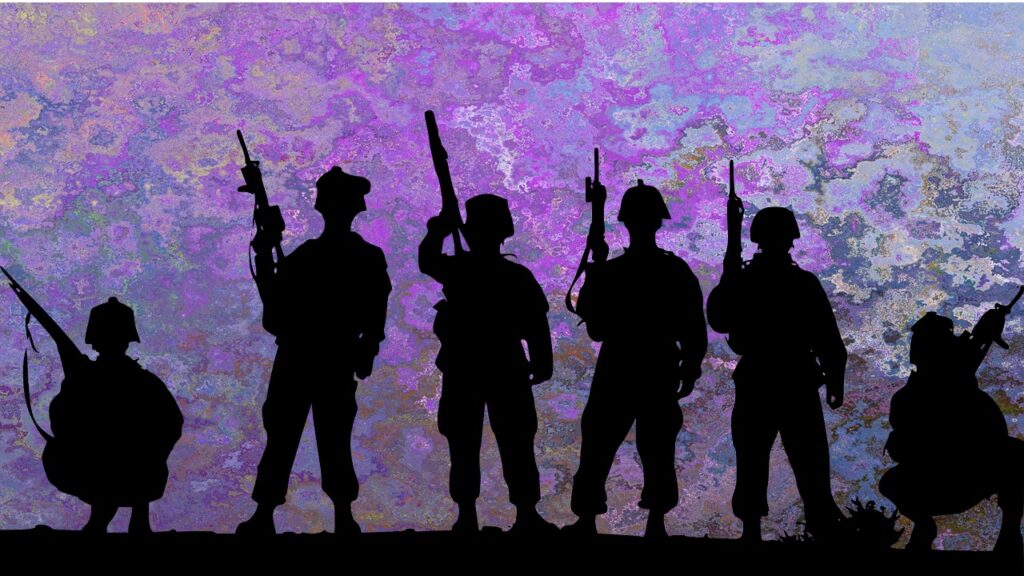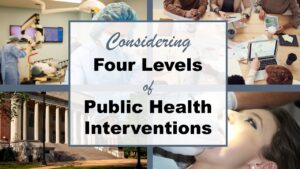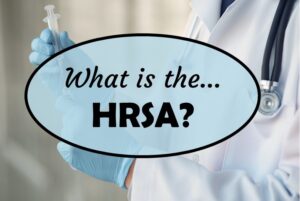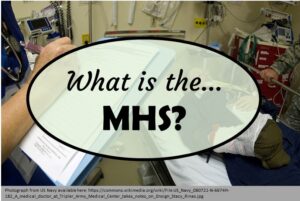“What is the MHS?” is one of the early questions that came up when I started working at the United States (US) Army in 2008. MHS stands for Military Health System, which until I got to the Army, I admit I had not really thought about. How do servicepeople in the US get their healthcare? In the US, the answer to, “What is the MHS?” is not very straightforward, as I will explain in this blog post.
What is the MHS?
The Military Health System, or MHS, is basically the framework behind how people who are active duty in the military in the US access healthcare. “Active duty” means that they are currently enlisted in the military, and could be deployed (which includes reservists). It does not include those who have left enlistment – those individuals are called veterans, and they are not allowed to use the MHS. Instead, when leaving the military, all active duty servicepeople are offered the opportunity to sign up for the Veterans Administration (VA) healthcare, which I talk about in another blog post.
The crux of the issue is that people tend to get injured in the military – even if it’s just wear and tear on their bodies from doing so much physical work. But then they leave, and many enter the VA, and they have long-term co-morbidities. So the MHS doesn’t really handle much in the way of chronic illness, and the patients in the system are largely young men.
What does the MHS do?
If you go to the “about” page for the MHS, you’ll find this list of seven “elements” of the MHS. I want to talk about three of them: Uniformed Services University of the Health Sciences (abbreviated USUHS, and pronounced, “YOU-shus”), the system of military treatment facilities (MTFs), and TRICARE (which doesn’t stand for anything).
Uniformed Services University of the Health Sciences (USUHS)
USUHS is the official military health university – meaning that the only way you can go there and get a health degree is to be in the military. It is a very prestigious place, and I encourage anyone who wants to do military medicine to set their sights high and try to get into the military and go to USUHS. But please understand that people who enter the military and are provided the benefit of schooling can usually go to any university that will fulfill the requirements. When I was at the University of South Florida (USF), I met several people who were active duty in the military, but were attending college at USF to get a health degree.
But in reality, if you go into the military, you will probably be doing primary care if you are in internal medicine, or general surgery if you are in surgery. This is because, unlike the US healthcare system at large, the MHS is set up properly, with an emphasis on prevention and primary care. So if you want to study a specialty, going the way of the military is probably not for you.
Military Treatment Facilities (MTFs)
When servicepeople are active duty and in the US, they typically live on a military base. If you are in the military or in a military family, you are very used to these bases. However, to civilians like me, they seem like a new world when you enter the first time. Fort Bragg in North Carolina is a great example of a huge military base. They are the entire cities with schools, stores, and – of course – healthcare facilities.
The healthcare facilities on these bases are called MTFs, and as you can imagine, no one goes there except people in the active duty military or their families (who are eligible for the same benefits as their serving family member is eligible for). But because there are not MTFs all over the US, but there are servicepeople all over the US (for example, studying at USF), there needs to be an arrangement for them. That is where TRICARE comes in.
TRICARE
TRICARE is an arrangement between the Department of Defense (DoD) and civilian healthcare facilities that is managed by way of health insurance contracts through TRICARE. As a reminder, the main way people in the US have access to their healthcare is through monthly payments to private health insurance companies (which is linked in a roundabout way to the reason why the US had such a high rate of death in the COVID-19 pandemic).
How TRICARE works is that the military makes contracts with health insurances all over the US so no matter where a servicemember is stationed, they can access care. So if they are at Fort Bragg, they can go to an MTF, but if they are going to college at a university nowhere near a military base, then they can use TRICARE. They can look up what providers are covered by TRICARE in their area, and go to see those.
My Take on the MHS
Let me start by telling you the good things about the MHS. It is extremely well-run and well-organized. The trained servicepeople working in the MTFs are top notch and amazing. If you ever hire someone trained in health care at the military, you are hiring someone with excellent training and experience. The data are kept very neatly in the MHS data repository, and if you partner with the right teams, you can analyze the data and produce a lot of extremely actionable information.
Now let me tell you what’s wrong with the MHS. First, TRICARE sucks – and that’s because the US healthcare system sucks. I had a colleague who was an officer in the Army who was deployed to Iraq and came back with post-traumatic stress disorder (PTSD). She could not find any mental health providers to see in the Boston area that were on TRICARE – that shows you how bad TRICARE was for mental health care access. And this was in the face of high suicide rates in the Army that we were studying!
Interestingly – or perhaps alarmingly, the military and the VA really don’t work together routinely on health studies, or healthcare, or really anything. In fact, they are kind of rivals, or opponents – I would even say they are adversaries, and this is for a very complex reason that is hard to explain, but let me try.
The VA is at the same level as the DoD, and they are fighting for money from Congress. But the DoD does not have the health burden the VA has, so the VA is constantly begging for more money. This is while the DoD, which buys weapons in our military-industrial complex, gets overfunded to do so, and therefore does not need to appropriate much money to health (compared to what it spends on weapons that go unused). So, the VA sees that waste, and also, active duty servicemembers getting hurt and sick and ending up in the VA, and wants the DoD to pay its share – but it doesn’t. And everyone suffers.
What is the MHS Today?
As times change, the answer to the question, “What is the MHS?” changes. Now we are post-pandemic, and as the civilian healthcare system remodels, so will the MHS. We will see what the future will bring.
Updated April 7, 2022. Added link to Veteran’s guide April 15, 2023.
Read all the public health alphabet soup posts, and learn about the public health landscape!
“What is the MHS?” is a question not always asked by public health data scientists, but it should be. The MHS – or Military Health System – serves the US military through healthcare facilities in locations where civilians do not have access. I provide an explanation on my blog post.

